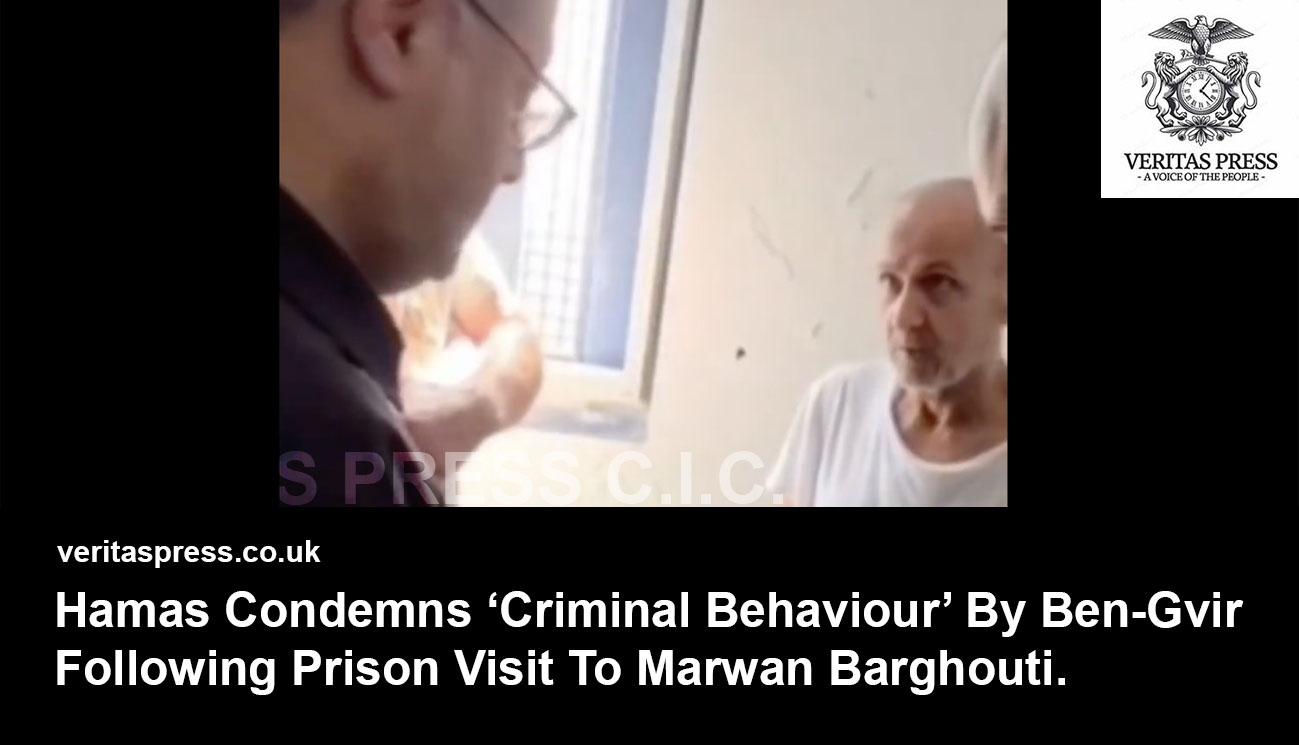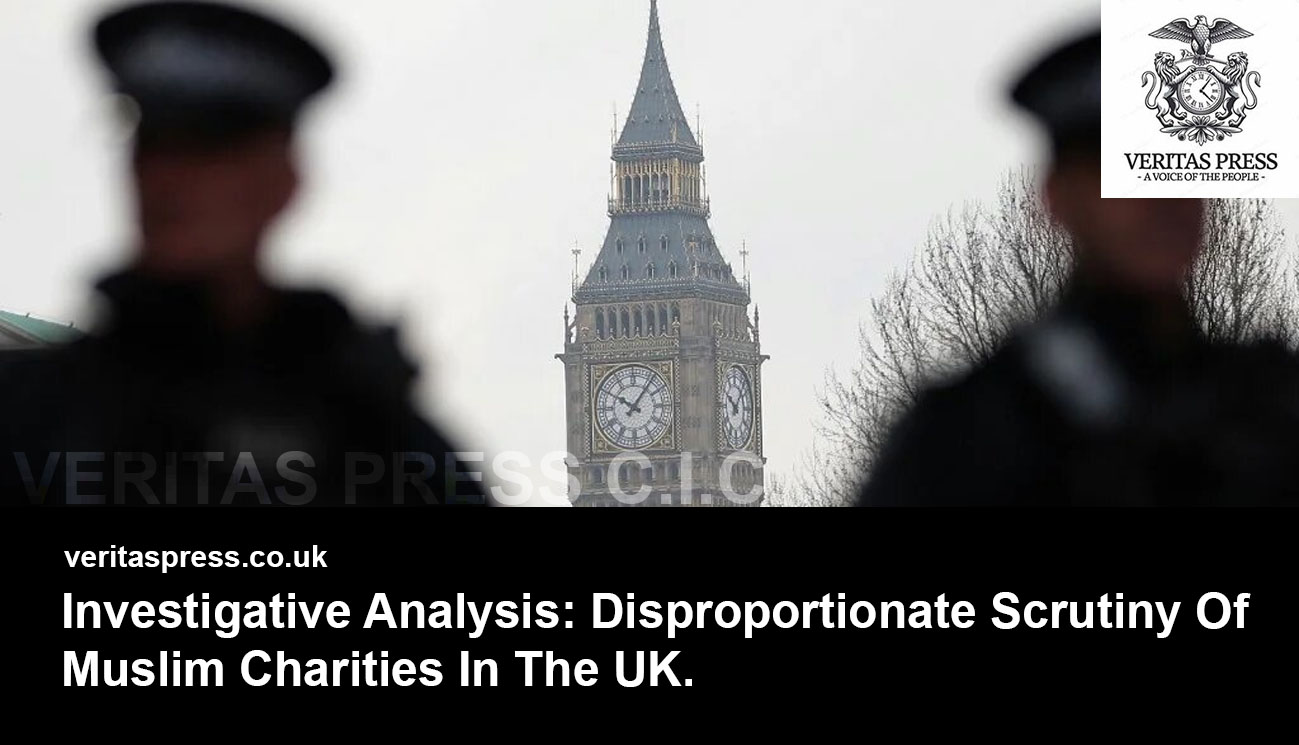Press Release: Veritas Press C.I.C.
Author: Kamran Faqir
Article Date Published: 15 Aug 2025 at 12:05 GMT
Category: Middle East | Palestine-Gaza | US-Israel At War
Source(s): Veritas Press C.I.C. | Multi News Agencies
Hamas has strongly denounced the actions of Israeli National Security Minister Itamar Ben-Gvir during his recent visit to Fatah leader Marwan Barghouti’s prison cell, characterising them as “criminal behaviour,” a display of “cowardice,” and evidence of “the occupation’s fascism and hostility to all human values.”
The group asserted that the minister’s intimidation tactics would only bolster Barghouti’s resolve, reinforcing unity among Palestine’s incarcerated leadership against what Hamas describes as systematic repression. In its statement, Hamas invoked the horrific abuses reported at the Sde Teiman prison, including allegations of sexual violence and violations against doctors, journalists, and medical staff, as part of a broader pattern of war crimes.
Hamas urged Palestinians to stand in solidarity with the prisoners and pressed the United Nations and other international bodies to take immediate action to support detainees held at Sde Teiman and other notorious facilities.
Barghouti’s Lawyer Calls For International Protection:
Marwan Barghouti’s lawyer denounced the prison-cell raid while his client was shackled and the death threats issued by Ben-Gvir as “fascist,” warning that Barghouti faces serious danger. The lawyer urged global actors to ensure Barghouti’s protection from execution or assassination.
Ministerial Provocation: The Prison Visit.
During the visit to Ganot Prison (formerly Ramon and Nafha), Ben-Gvir directly addressed the visibly frail and gaunt 66-year-old Barghouti. In footage broadcast by Israel’s Channel 12, he warned:
“You won’t win. Whoever messes with the nation of Israel, whoever murders our children and women – we will wipe them out. You should know this, [this happened] throughout history.”
This marks the first public video appearance of Barghouti in over a decade. His family and rights groups reported that he has been held in solitary confinement since the October 7, 2023, Hamas-led attacks and appears significantly weakened.
Israel’s Prison Service denies allegations of abuse, yet Barghouti’s family described him as exhausted, hungry, and frail, expressing fears for his life.
Palestinian Authority And Human Rights Groups React:
The Palestinian Foreign Ministry condemned Ben-Gvir’s actions as “an unprecedented provocation and organised state terrorism,” aligning them with crimes of genocide, displacement, and annexation experienced by Palestinian prisoners.
Hussein al-Sheikh, a top official in the Palestinian Authority, accused the minister’s behaviour of constituting “psychological, moral and physical terrorism” that contravenes international and humanitarian law. He called for urgent international intervention to protect Palestinian detainees.
Broader Context: Barghouti’s Profile And Prison Treatment.
Barghouti, imprisoned since 2002 and serving multiple life sentences, has long been seen as a unifying figure in Palestinian politics, often likened to Nelson Mandela. Throughout his incarceration, he has led initiatives like the 2006 Palestinian Prisoners’ Document advocating political settlement and has organised educational efforts for fellow inmates.
Reports of his treatment are deeply troubling: prolonged solitary confinement, sleep deprivation, physical abuse, forced kneeling, stripping, dragging, and loud noise assaults. Rights groups have flagged these as constituting torture. His attempts at lodging complaints have been rejected by Israeli authorities.
Why It Matters:
- Escalation of Tensions: This prison-cell confrontation is a stark escalation in Israel’s treatment of Palestinian leaders, raising legal and ethical concerns under international law.
- Symbolic Impact: Barghouti remains a potent symbol for Palestinian resistance and the possibility of political reconciliation; his weakening health and threats against him carry high symbolic weight.
- International Scrutiny: The incident amplifies calls for oversight from the Red Cross, UN, and international human rights bodies, especially given the broader context of alleged abuses in Israeli prisons.
Key Points:
- Hamas Reaction – Condemned Ben-Gvir’s behaviour as fascist intimidation, calling for solidarity and international action.
- Legal Demands – Barghouti’s lawyer demanded protection, calling threats “fascist” and highlighting a serious risk to his life.
- Minister’s Remarks – Ben-Gvir told Barghouti: “Whoever messes with Israel… we will wipe them out,” sparking outrage.
- Political Fallout – Palestinian Authority labelled the incident as “organised state terrorism”; called for global intervention.
- Human Rights Context – Barghouti has endured prolonged abuse and torture in prison; his treatment evokes broader human rights crises.
Conclusion – A Calculated Spectacle of Power and Impunity:
The Ben-Gvir–Barghouti confrontation was not an isolated outburst but a deliberate political performance, crafted for domestic consumption and calibrated to send a message of dominance to both Palestinians and the Israeli far right. In storming the cell of the most prominent and politically unifying Palestinian prisoner, the Israeli National Security Minister was not simply taunting a detainee; he was flexing the machinery of state power to remind the world that Israel’s prison system operates beyond the reach of meaningful oversight.
This was a theatre of humiliation staged inside a penal system already documented for systemic torture, sexual abuse, enforced disappearances, and medical neglect. The footage of a visibly weakened Barghouti, pale, frail, shackled, was not an accident; it was visual evidence of a policy: to break the spirit of Palestinian leadership while broadcasting that no one, not even the “Palestinian Mandela,” is beyond reach.
What makes this episode more dangerous is its timing. It comes amid credible UN warnings of sexual violence and lethal abuse in Israeli detention facilities such as Sde Teiman, where videos of rape and torture have leaked, and in the shadow of a genocidal campaign in Gaza that has already eroded every remaining pretence of adherence to international humanitarian law.
For the international community, the stakes are not just about one man’s safety; they are about whether the global legal order can confront a state that publicly threatens political prisoners with execution, normalises torture, and weaponises incarceration as an extension of military occupation.
If such open intimidation and abuse are met, yet again, with little more than statements of concern, it will confirm what Palestinian prisoners have long understood: that impunity is not an accidental by-product of the system—it is the system.
What happened in Ganot Prison was not a personal grudge match between Itamar Ben-Gvir and Marwan Barghouti; it was the latest chapter in a strategic campaign to neutralise, decapitate, and ultimately erase the political leadership of an occupied people.
Since 1967, Israel has cycled through methods, targeted assassinations, indefinite detention without charge, exile, and systematic torture, not as collateral excesses of war but as deliberate tools of governance. Every generation of Palestinian leadership, from grassroots organisers to elected officials, has been met with prison cells or drone strikes. The message has been unchanging: political resistance will be criminalised, and political reconciliation will be sabotaged before it can take root.
Barghouti’s imprisonment is a cornerstone of this doctrine. His refusal to bargain away the right to self-determination, his cross-factional credibility, and his ability to mobilise from behind bars make him a threat not just to Israeli security narratives but to the entire architecture of occupation. By publicly humiliating and threatening him with death, Ben-Gvir was signalling to Palestinians, and to his own political base, that even figures who could unify Palestinian politics will be kept in chains or buried before they are allowed to lead.
The machinery enabling this is not confined to Israel’s hard-right government. It is reinforced by Western governments that condemn “human rights abuses” in rhetoric while supplying military aid, shielding Israel from ICC prosecution, and refusing to enforce international law when violations are committed in plain view. The impunity that protects Ben-Gvir today is the same impunity that has allowed decades of extrajudicial killings, from Ghassan Kanafani in 1972 to Shireen Abu Akleh in 2022.
Barghouti’s fate will be a litmus test. If he survives, it will be despite the Israeli state’s campaign to break him, and because international actors were finally forced, by public pressure, by moral outrage, to intervene. If he does not, his death will not just be a tragedy. It will be the predictable, preventable result of a system that has learned it can kill leaders in the dark and suffer nothing more than a brief storm of statements.
In this sense, the question is no longer whether the world will act to protect Marwan Barghouti. The question is whether it will allow Israel to finish what it began decades ago: the slow-motion destruction of a people’s political future, carried out one prison cell, one assassination, one silenced voice at a time.




























Leave a Reply